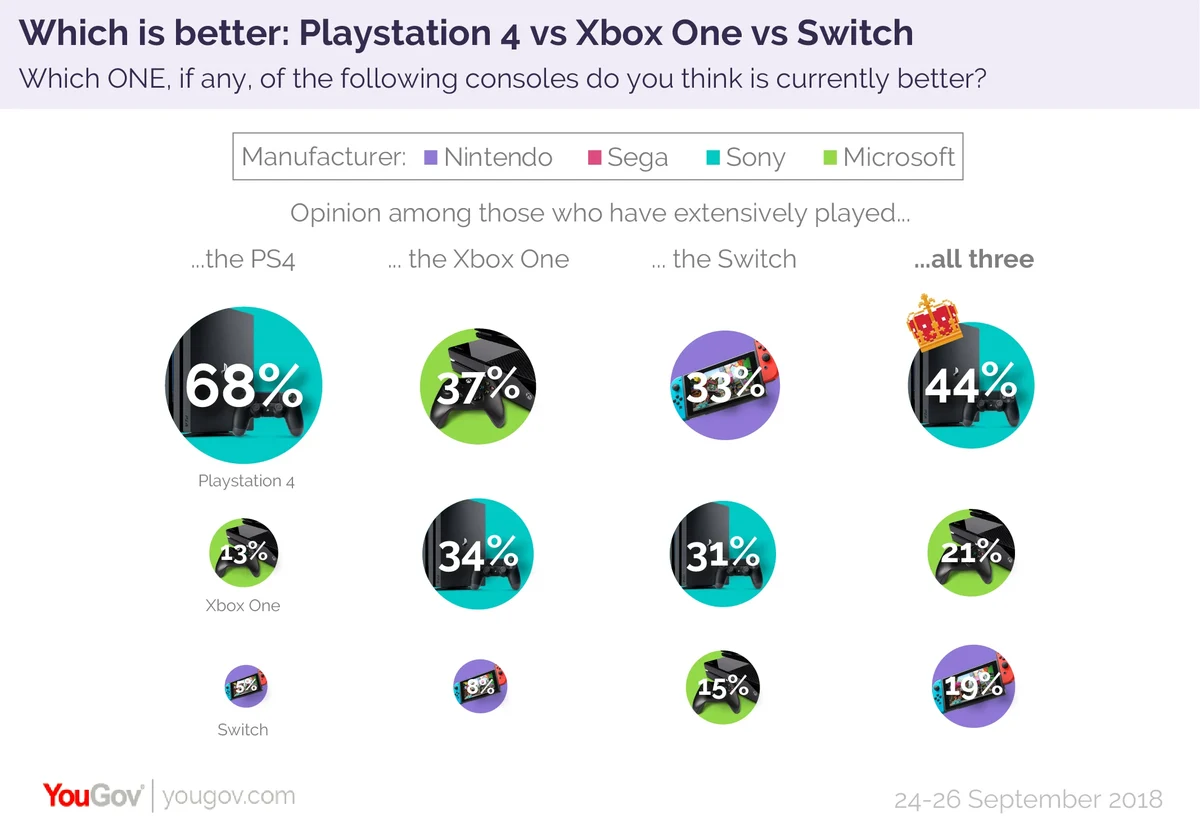Sony, Nintendo, Microsoft and Sega battle it out: which was the most popular console of each generation?
Last month, to much fanfare but mediocre reviews, the PlayStation Classic was released. The miniature version of Sony’s 1994 hit console with 20 classic pre-loaded games follows in the wake of Nintendo’s similar and successful miniature versions of the NES and Super Nintendo.
With all the nostalgia currently surrounding old games consoles, YouGov Omnibus has looked at which were the most widely played consoles – and also which were the best.
The original PlayStation is Britain’s third most widely played console. One in six Britons (16%) say they’ve significant experience on it, including one in three 25 to 34 year olds. The console’s successor, PlayStation 2, was even more popular. Almost one in five Britons (19%) say they’ve played extensively on one.
But in terms of coverage, the console king is the Nintendo Wii, which almost a quarter of Brits (23%) have played on for a notable amount of time - including approaching half (46%) of 18 to 24 year olds.
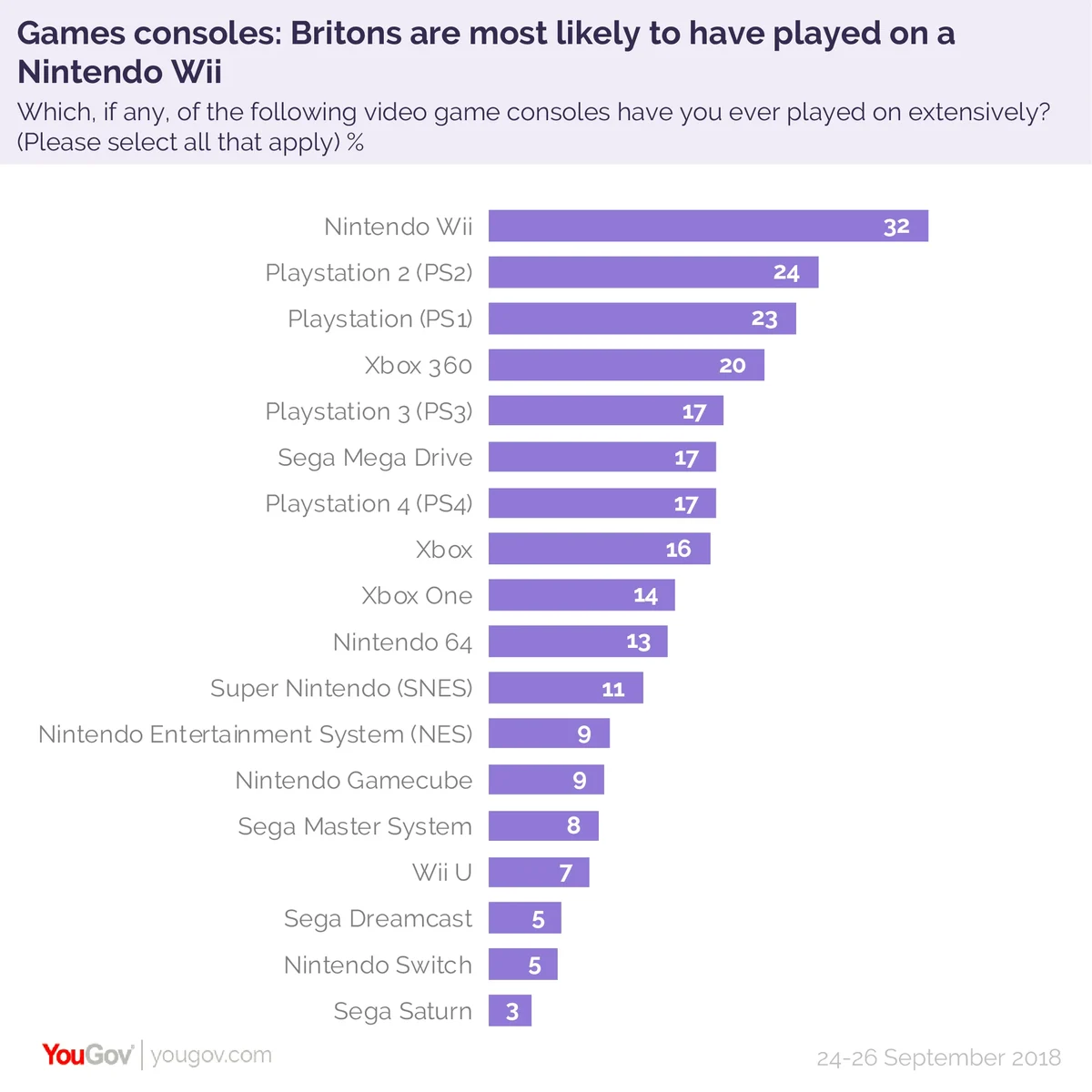
Of course, having thrown a significant number of hours of your life at a console doesn’t mean that you think it is the best one (especially given that many households will only have contained one console from any given generation).
So we asked those players who have spent time on all the main consoles of each generation technology which was the best.
Third generation: NES vs Master System
It’s perhaps no surprise that the console which popularised video gaming’s most famous character – Mario, in the eponymous Super Mario Bros game – has proven to be the most popular console of its time. Of those who have played both the NES and Master System, half (52%) preferred Nintendo’s offering and only 35% Sega’s.
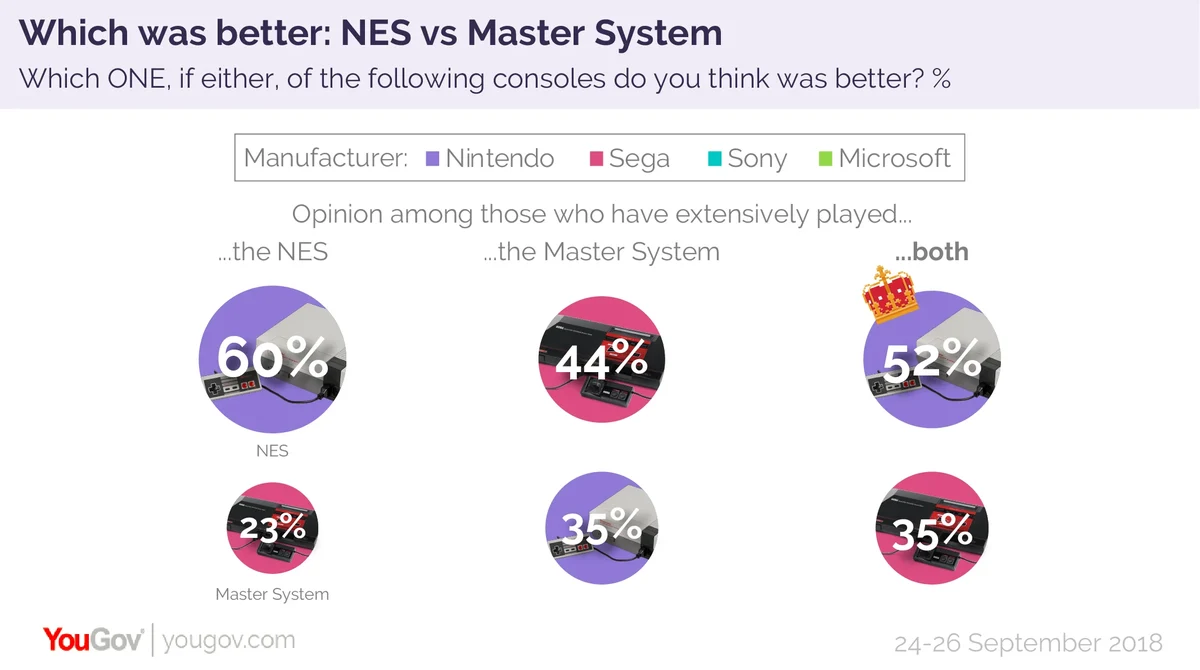
Fourth generation: Super Nintendo vs Mega Drive
Arguably the most relevant retro gaming reference point, given that miniature versions of both consoles with pre-loaded games installed have been rereleased recently. The fourth generation is by far the most closely fought of our console wars - among those who have played both consoles, the Super Nintendo edges it at 47% to the Mega Drive’s 43%.
This would also prove to be the last time that gamers consider Nintendo to have come out on top.
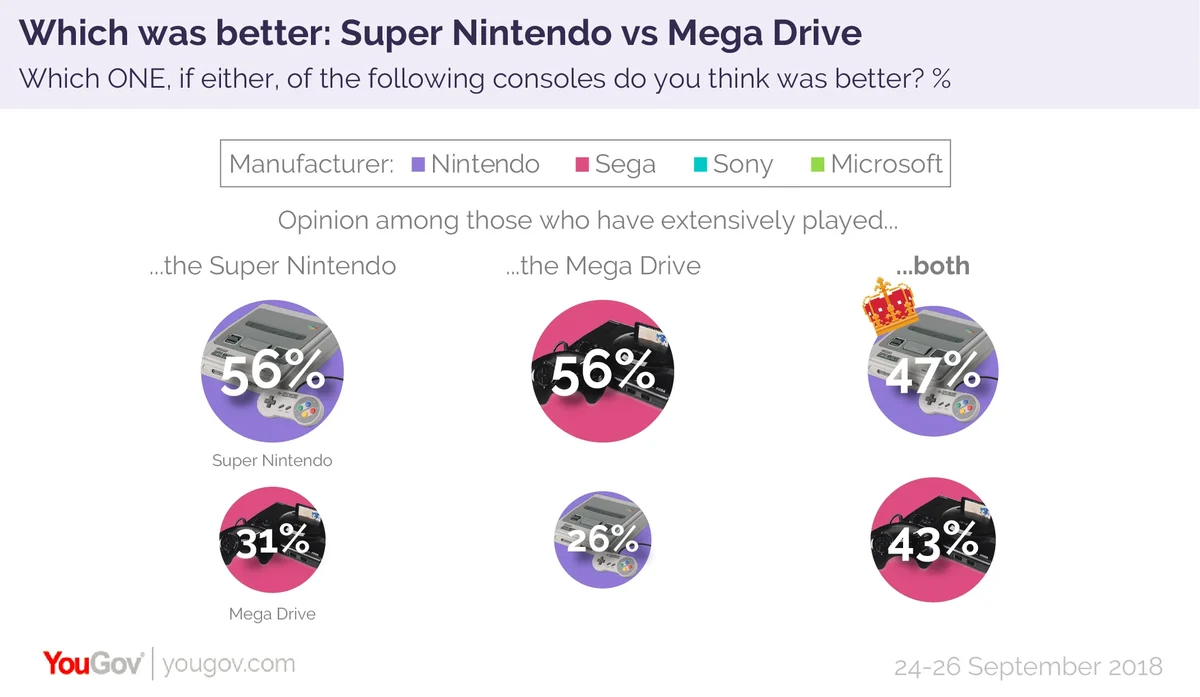
Fifth generation: PS1 vs N64
Sony stormed into the fifth generation with their first ever console, the Playstation (PS1), and instantly dominated the market. Three times as many Playstations would ultimately be sold than Nintendo 64s.
Among those who played both the PS1 and the N64, Sony secures a healthy favourite majority (57%). Despite games like GoldenEye, Super Mario 64 and The Legend of Zelda: Ocarina of Time, just three in ten (31%) plump for Nintendo.
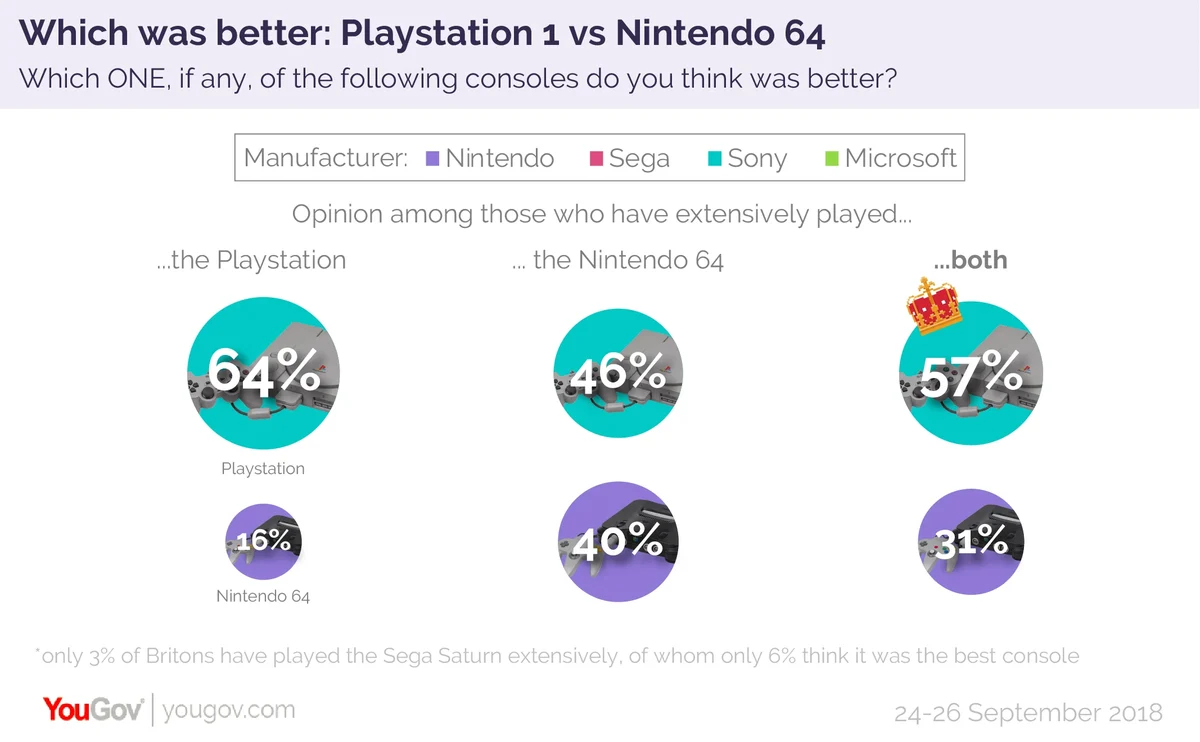
Sega fanboys will note the absence of the Sega Saturn from this analysis – while we did ask about the Saturn, only 3% of Brits ever played on it to any great extent, and it never gained significant traction. In any case, only 6% of those who played a Sega Saturn think it was the best console of the generation.
Sixth generation: PS2 vs Xbox vs Nintendo Gamecube
No console generation before or since has been so dominated by one entrant as the sixth generation is by Sony’s Playstation 2. Enjoying an 18 month release lead over its two main rivals, the PS2 sold 3 times the number of Xbox and Gamecubes combined.
The sixth generation also marked Microsoft’s foray into the console market with the Xbox. Nevertheless, among this more crowded console field Sony still enjoys a commanding lead. Among those who played extensively on all three main consoles, almost half (48%) say the PS2 was the better console. Only 24% back the Xbox, and just 18% the Gamecube.
In fact, so popular was Sony’s console that even Xbox and Gamecube players prefer it (37% vs 31% in the case of the Xbox, and 43% vs 24% in the case of the Gamecube).
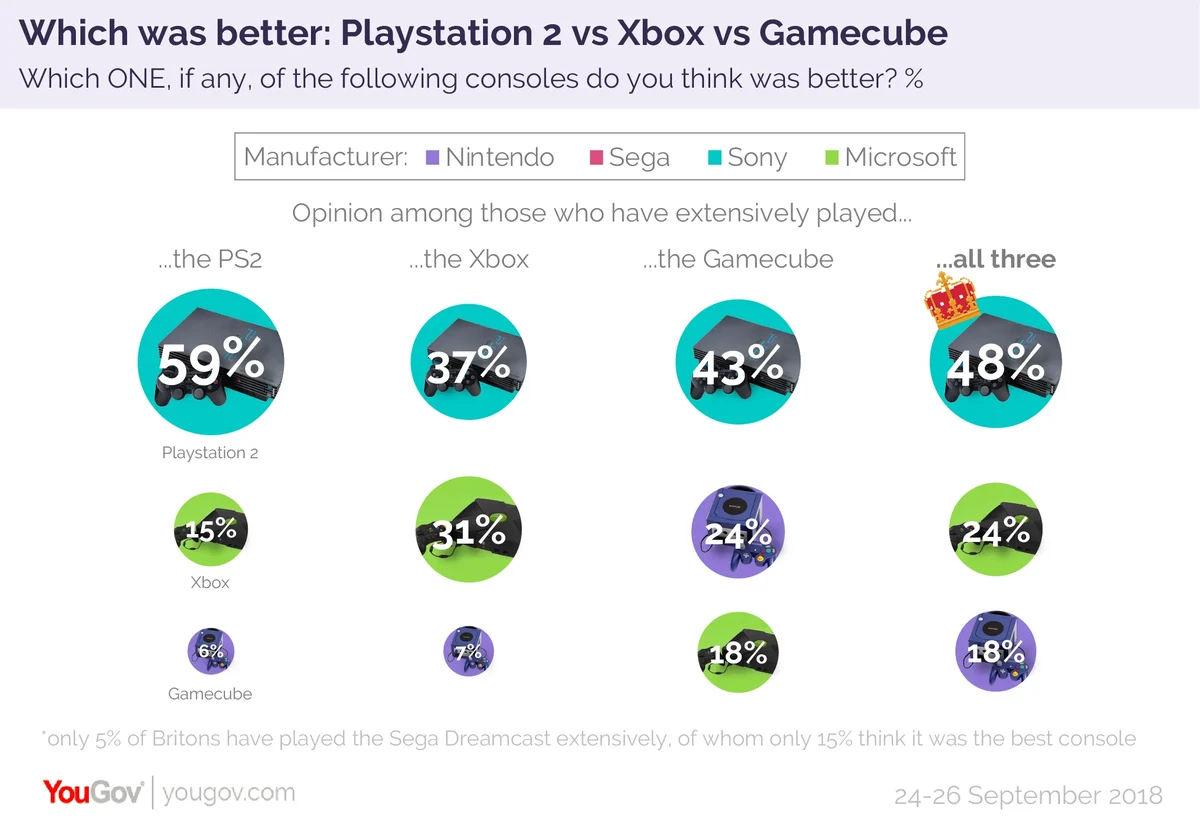
Again, Sega supporters will note the absence of the Dreamcast above. As with the previous generation’s Saturn, Sega’s final console was not held in the same esteem as its contemporaries, and only 5% of Brits have played one very much (and just 15% of those who did think it was the best of the bunch).
Seventh generation: PS3 vs Xbox 360 vs Nintendo Wii
The seventh generation of console wars also served as a proxy conflict for the battle between Blu-ray and HD DVD. The fact that a PS3 – which contained a built in Blu-ray player – was cheaper than a standalone Blu-ray player, while Microsoft’s Xbox 360 required an expensive add-on component to play HD DVDs, is considered to be one of the big reasons why Blu-ray ultimately prevailed over its rival.
Sony once again emerges the victor, with 45% of those who played extensively on all three consoles crowning it the king, compared to 32% for the Xbox 360 and 13% for the Nintendo Wii.
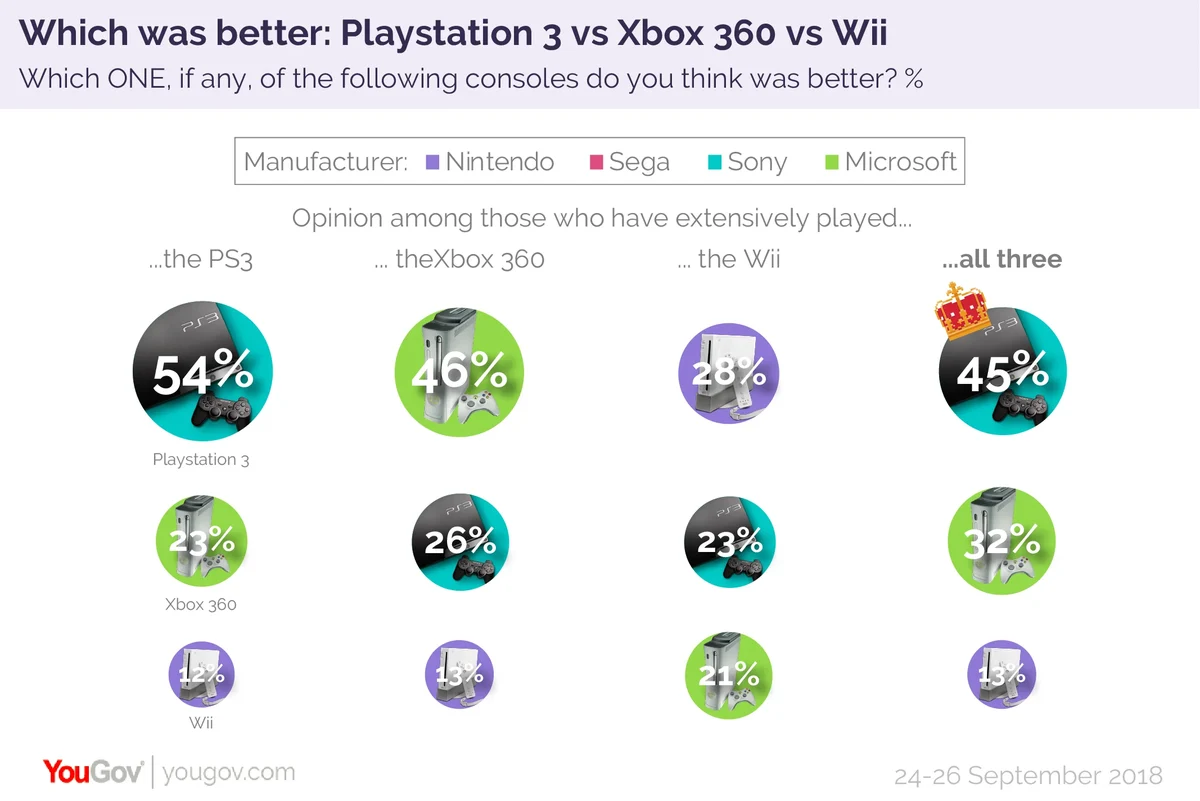
Eighth generation: PS4 vs Xbox One vs Nintendo Switch
Uniquely, Nintendo has two eighth generation consoles: the Wii U, launched in 2012, and the Switch, launched in 2017. The Wii U was widely held to be a flop, whereas the Nintendo Switch is performing far more successfully. Given the failure of the Wii U, we’ve only included people who played the PS4, Xbox One and the Nintendo Switch in the analysis for best console – for the record, only 6% of people who’ve played the Wii U think it’s the best console of the generation.
In any case, Sony is once again dominating the latest console conflict. Its PS4 secures 44% of the vote among those who have played all three main consoles – more votes than the Xbox One (21%) and Nintendo Switch (19%) combined.
